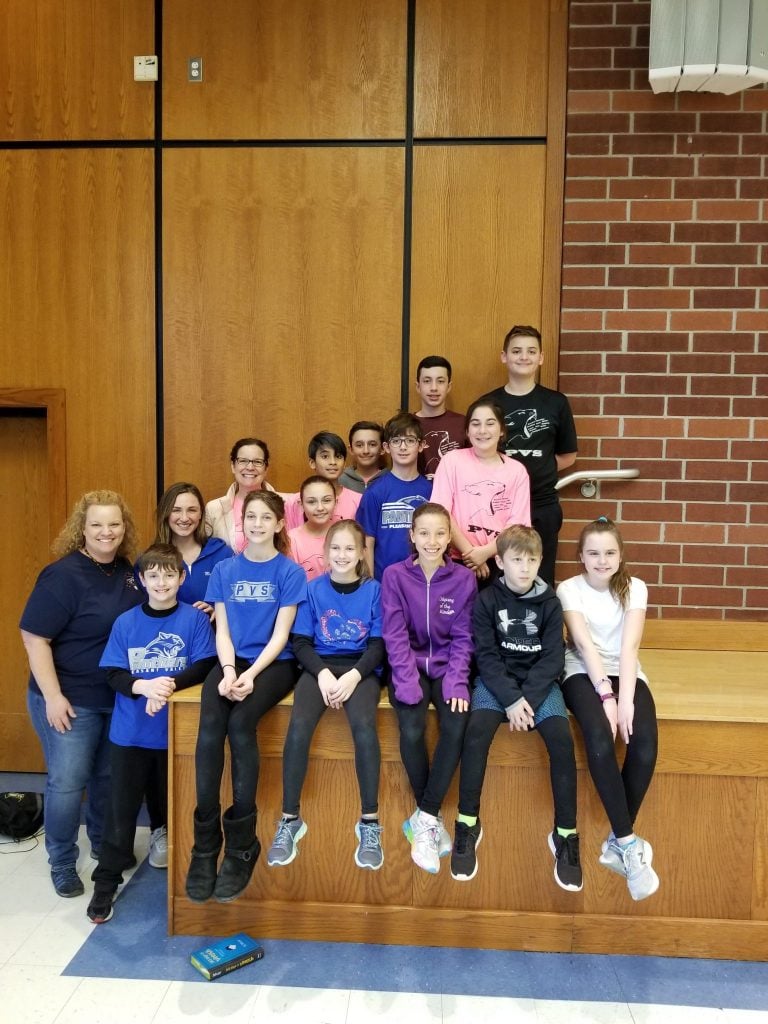
Fourth- and fifth-grade students from Pleasant Valley Elementary School placed fourth in the Odyssey of the Mind competition in Ewing on April 6.
The competition is a team-building event where students collaborate to think of creative solutions to problems given to them in advance and the day of the event. Two years ago, Jennifer Boston, PVS sixth-grade teacher, brought the program to the school after seeing another district’s students participate in it.
“Last year, we had one team that was grades fourth and fifth,” said Boston. “This year, because it was so successful, we were able to add a sixth-grade team. Odyssey of the Mind is also divided by sixth through eighth grade, and third through fourth. We broke the kids up for that and I think it’s beneficial to the students and the aspect of problem-solving.”
The team that placed fourth at states was fourth-grade teacher Alexis Manzo’s team, which was up against 10 to 12 other teams throughout the state. Previously, another team composed of sixth-graders, coached by Boston, competed in the Coastal Plains Regional competition (grouping for South Jersey teams).
Manzo’s team consisted of Gabe Angelone, Ariella DiFabio, Andrew Kierland, Stephen Manzonni, Victoria Perretti, Katie Reichert and Sarina Tortella. This is the highest position Pleasant Valley has obtained since the program’s start at the school.
“We got tied for first for the fourth- and fifth-grade teams, and then we went to states – states is more intense – and in between that time was a month where you could change your problems,” said Manzo. “We looked to see what would be beneficial in changing, and the kids did all of that.”
The two added the advancement of the students in the competition was all due to them as coaches aren’t allowed to tell the kids what they can and cannot do, but more so ask questions along the lines of “what do you think you should do?”
“They don’t have a fear of failure because they are put in situations during spontaneous practice where they’re constantly reaching for the stars,” said Boston.
In the competition, the students are given two types of problems. One is long-term where they’re given the problem in advance and the students are able to work together, at length, about possible solutions and come up with an eight-minute solution to the problem.
Students are also tasked with solving a problem on the spot in a “spontaneous situation” within three minutes the day of the competition. Boston provided an oversimplified version of a problem the teams are given where they could be asked to “say a word that ends in the last letter of the word ‘fox.'”
“They’re scored on creativity, their ability to work together as a team,” added Boston. “We do a lot of practice with our teams to get them ready for anything that could come up.”
Manzo said participating in the competition as a coach has altered the way she approaches teaching and leans more to giving students “more responsibility and questions than answers.” Boston added she’s witnessed one of her students, who was in the competition, approaching classwork differently than prior to the start of the competition.
“It challenges them in a different way,” said Boston. “It’s a different end game because there’s no right answer. In school in general, we’re focused on one right answer to a question, whereas with Odyssey, there is no right answer.”
Manzo added she and Boston hold try-outs to make the team because they’re looking for students who hold a certain personality trait that would help everyone succeed.
“The biggest thing is to be vulnerable with your ideas, but be able to listen and accept others,” said Manzo. “We have a lot of bright, motivated students who are at the top of their class, but the personality for Odyssey is also the person that can say ‘I understand my idea is not the best, and we’re going to go with yours and support it.'”
Both said the program provides students with a level of maturity that they likely wouldn’t get until they’re much older because they have to be able to recognize where their strengths and weaknesses lie.
The two hope to teach their colleagues more about the competition and ways to implement it into classroom lessons, and also wish to see the program grow more at Pleasant Valley.
“I’m proud that our district brought this program here, and I think it’s an absolute benefit for the students to have the opportunity to participate in a program like this,” said Boston.









